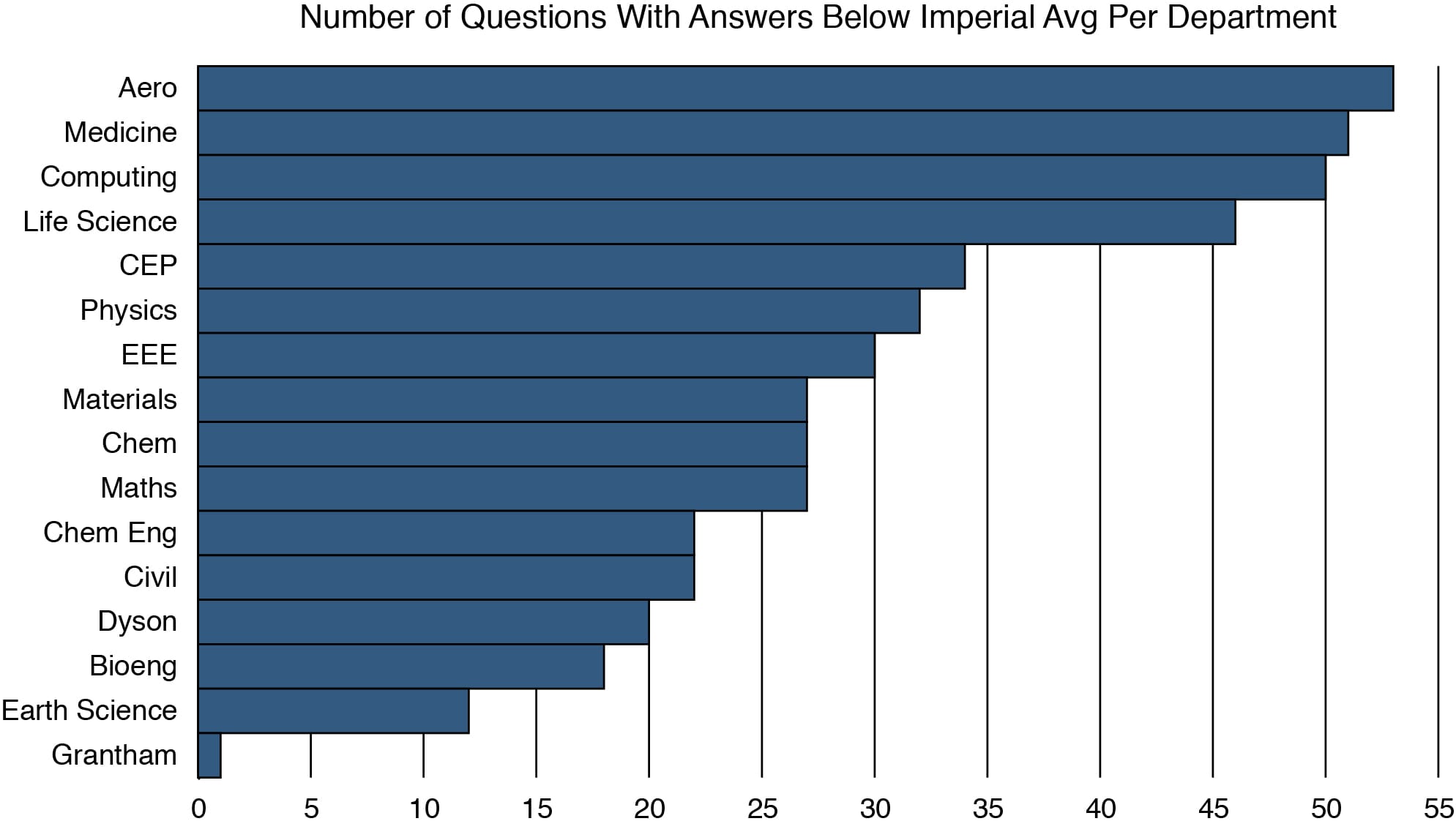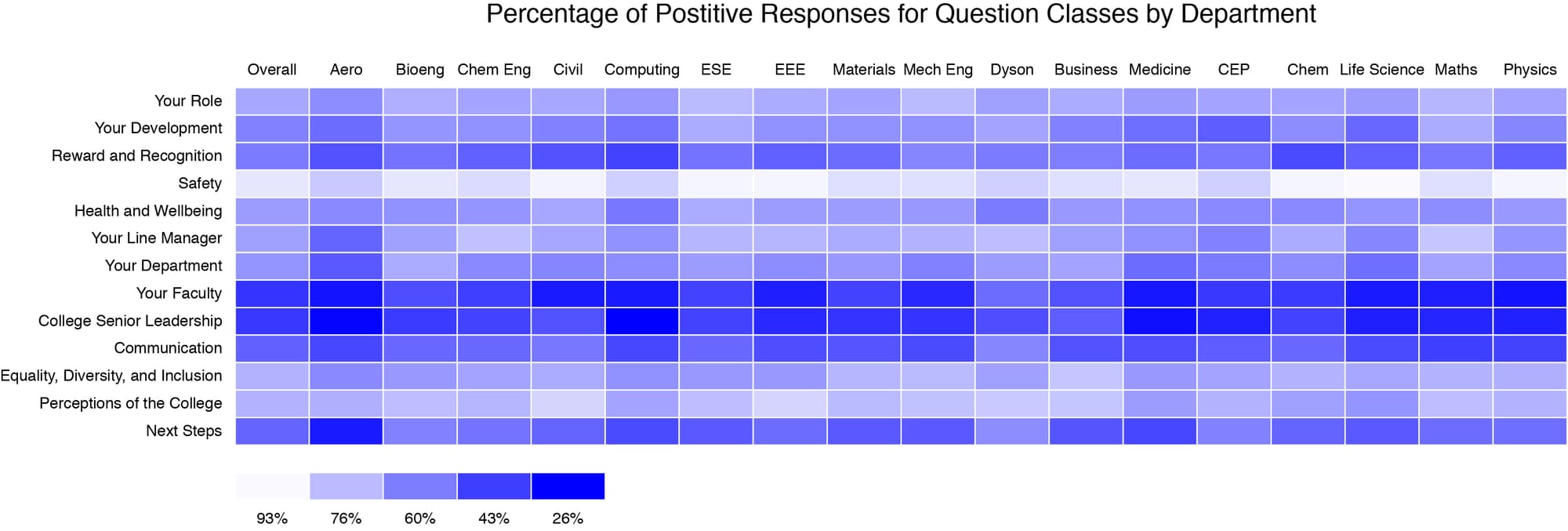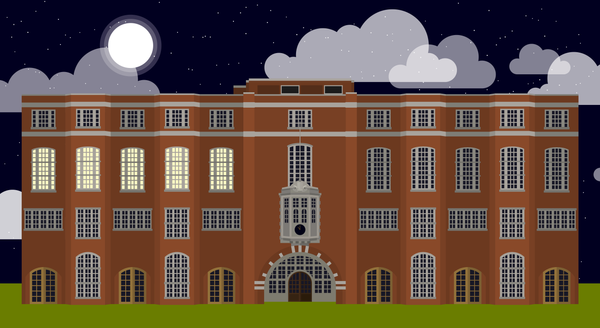Staff survey shows wide ranges in satisfaction
Staff satisfaction rates vary widely across different College sectors, according to Imperial’s staff survey results.

Imperial College released their staff survey results earlier this month. The survey, which was last carried out in 2014, asks staff members their opinions on a broad number of topics, including their faculty, College leadership, and whether they think the survey results will be acted upon.
College and Faculty Leadership
Out of all sections of the survey, leadership – both of Faculties and of College as a whole – scored lowest among staff.
Fewer than half of those surveyed felt there was effective leadership from Faculty heads, or had a clear understanding of the purpose of their Faculty. Staff in the Faculty of Natural Sciences were the least likely to know the objectives of their Faculty, with only 37% of staff feeling they understood them.
In terms of overall leadership, only 40% of staff felt that the College leaders showed effective leadership, and 45% felt they provided a clear direction for the College’s future.
One of the questions eliciting the lowest scores asked whether changes made are made for the better, with only 34% of staff agreeing. The Departments of Aeronautics, Computing, and Physics were the least likely to agree, with less than a quarter of staff feeling that changes were an improvement. Staff in the Faculties of Medicine and Natural Science, and in the Union, were also unlikely to think changes made things better. Somewhat surprisingly, the overall response of 34% still places Imperial second out of the ten universities used as a benchmark.
It could be argued that a contributor to this divide between College leadership and staff is the result of issues with communications: only 45% of staff agreed that the communications received helped them understand College-level decisions, while just over half felt sufficiently involved in decisions impacting their role.
One of the areas of College’s strategy that the survey reflected poorly upon was the ‘Imperial Expectations’ – seven statements the College claims “show how we respect and support each other in achieving personal goals and the College’s strategic objectives”. Examples include “champion a positive approach to change and opportunity” and “deliver positive outcomes”.
Overall, only 37% of staff thought that these were useful to their role at Imperial, with a large number of staff having no opinion at all. Staff members working more closely to the central faculty (e.g. those working in Campus Services) were more likely to find Imperial Expectations useful, while departmental staff generally had a poor opinion of them: in the Mathematics department only 22% of staff thought ‘Imperial Expectations’ were useful.

Departments and Collaboration
The survey showed departmental staff were satisfied with their work, and had good perceptions of the College: over 90% of staff surveyed felt that they had good relationships with their colleagues, and that they were trusted to organise their own workload. The vast majority also knew what was expected of them in their role. Safety was singled out as an area Imperial did particularly well in, with the majority feeling their department ensured they were safe in the workplace.
The majority of staff felt proud to work for the College, and 80% felt a sense of personal accomplishment.
However, while the data seem to show that people were generally satisfied with their departments, they revealed that few staff thought that there was enough collaboration. Only 34% of staff agreed that there was ‘effective collaboration between Departments that work within my Faculty’. Of the four main Faculties, the Faculty of Natural Sciences scored the worst on this question, with only 30% of staff seeing evidence of effective collaboration.
“In the Department of Aeronautics, only a third of staff thought action would be taken after the survey”
Within departments, there was evidence of increased collaboration, with 56% agreeing there was effective collaboration between teams within a department. However, some sectors scored poorly, with the Departments of Aeronautical Engineering, Civil Engineering, and the Centre for Environmental Policy all reporting scores of under 50%.
Departmental Breakdown
A number of departments did particularly poorly in the survey: the Department of Aeronautics, in particular, stood out for its low scores, with 53 out of 58 questions garnering a below-average response.
Aeronautics staff were among those to have the worst opinion of their own Departments, their Faculty, and senior leadership as a whole. Fewer than half the staff surveyed felt that they had enough resources to do their job, while only 29% felt that their contributions to the College were valued and recognised.
The Department of Computing also scored poorly, with 50 questions below the Imperial average. It was the department with the least positive opinions of College senior leadership, and staff were among those least likely to feel valued at College: only 37% felt that their pay was fair, and under half thought that their contributions were valued. A number of staff felt Imperial did not care about their welfare, with only 31% agreeing that the College cared about their health and wellbeing. The results obtained from Imperial College Union staff, half of whom completed the survey, seemed to reveal a sense of feeling under-recognised, with only 39% feeling that their work was recognised as a contribution to College. Union staff also had among the lowest opinions of the College senior leadership.

In a statement to Felix, a Union representative stated that while the Union participates in the survey, “it is important to note that we are an independently-led organisation distinct from College, with our own strategic plan, management structure and Board of Trustees,” which “explains why they are less likely to consider themselves to be contributing to College’s strategy.”
The representative reported that the Union runs their own staff satisfaction survey every year, which found that 96% felt they understood the Union’s values, and 93% felt proud to work for ICU. They also pointed out that “regarding questions that are applicable to both College and ICU staff members, we are proud of our results (and) our scores are consistently at least 10% higher than College overall in some areas.
"Women working in the Life Science Department, in particular, were less satisfied with College leadership and line management, and were less clear about their department’s goals."
Other departments that did not feel a strong sense of belonging to the College included the Departments of Medicine and Life Sciences, with a minority of staff feeling a sense of belonging. In both these departments, less than half the staff felt they had enough resources to complete their work, and they scored poorly in their opinions of their respective Faculties. Women working in the Life Science Department, in particular, were less satisfied with College leadership and line management, and were less clear about their department’s goals. For some departments, the survey reflected well – the Grantham Institute, Imperial’s research hub for climate change and the environment, scored particularly highly across a number of questions. The Dyson School for Design Engineering and the Department of Earth Science Engineering also tended to score highly.
All departments have now completed ‘Action Plans’ to address the results of the survey. Among the lowest scoring departments, there is an emphasis on increasing communication within departments and with College leadership. The Departments of Aeronautical Engineering and Medicine both suggest increasing staff input on their Management Committees, while the Department of Computing states it will “provide forums for discussion on a termly basis”. Harassment and bullying will also be addressed, with an emphasis on “Active Bystander” training and encouraging staff to feel confident in expressing concerns.
A College representative told Felix: “the College level results and action plan are being discussed this Friday at Provost’s Board – one of the College’s most senior management boards – with updates to the community through Staff Briefing later this term.”
However, among the departments scoring lowest in the survey, there seemed to be a general feeling that things would stay the same. Overall, 53% of staff felt that action would be taken following the survey; however, in the Department of Aeronautics and the Union, only a third of staff surveyed felt confident that things would change, and fewer than half those surveyed in the Departments of Medicine and Computing had faith that action would be taken.
Bullying, Harassment, and Equality
One of the most sensitive questions in the survey asked respondents whether they had experienced bullying or harassment during the last twelve months at Imperial. Overall, only 81% of staff were able to deny they had experienced any such harassment or bullying, which places Imperial 15th out of 18 in a benchmark comparison with other universities surveyed.
This is an increase on the last two iterations of the survey: in 2014, when asked about harassment or bullying, 86% of staff were able to confirm they had experienced neither within the last three years. Several departments scored concerningly high on the question: in the Department of Aeronautical Engineering, the Centre for Environmental Policy, and the Dyson School of Design Engineering, 14% of staff said that they had been bullied or harassed within the last year. For the Department of Earth Science and Engineering, and College’s ICT department, the proportion was 13%. In the majority of cases, the bullying or harassment appears to have been carried out by a colleague, the individual’s line manager, or another manager within their department.
"In the Department of Aeronautical Engineering, the Centre for Environmental Policy, and the Dyson School of Design Engineering, 14% of staff said that they had been bullied or harassed within the last year"
College policy states “harassment, bullying, and/or victimisation is unacceptable,” and says “line managers have an obligation to tackle harassment”.
Another possibly controversial question asked respondents whether they believed ‘career progression is fair within Imperial (regardless of ethnic background, gender, religion, sexual orientation, disability or age)’. In total, 58% of staff agreed that career progression was fair, but some departments reported lower scores: less than half of ICT staff, and 52% of staff in the Department of Bioengineering, ESE, and Dyson School, felt progression was fair.
Women were less likely than men to feel career progression was fair, and were less likely to know what career progression opportunities were available. Imperial College was also a founder member of the Athena SWAN Charter, which was established to “encourage and recognise commitment to advancing the careers of women in STEM employment”. On their website, Imperial make it clear that, as a public body, they have a legal duty to ensure they take appropriate action to “advance quality of opportunity” for all staff.
The numbers reflect a decline since the last survey, which asked whether staff feel they had the opportunity for progression regardless of age, gender etc. In the last iteration, 85% of staff agreed that they had fair opportunities for career progression, against a UK average of 63%.
Comparison
A College representative emphasised that while “The Staff Survey is an important tool to hear the views of colleagues across our campuses”, that it “also allows us to benchmark ourselves against similar institutions.” Imperial did well compared to UK university benchmark measurements, with 14 questions five percentage points or more above the benchmark, and only one question below. However, a number of scores have decreased since the last survey: out of the 20 questions that could be compared to the 2014 survey, only one had increased, and ten had lower scores.
In a statement, a College representative said: “The talents of Imperial’s staff community are our greatest strength, and central to the College’s mission. We know that if we are to continue to attract and retain the very best staff, we must provide a supportive working environment. The College Strategy makes clear how we do that.“While we’re pleased to see that 87% of staff are proud to work at Imperial, and to have outperformed the sector generally, it’s clear that there is more still to do, and we are determined to continue to improve.”







